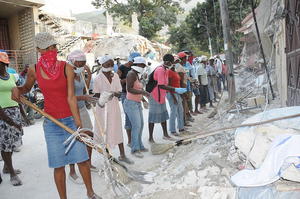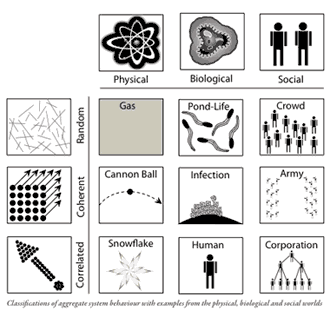Over 30 years of anarchist writing from Ireland listed under hundreds of topics
Analysis
Wikileaks: Terrorists or Freedom Fighters?
 Wikileaks continues to make almost daily headlines. Aside from the various revelations, there are also two widely told stories that are supposed to help us put these leaks into context.
Wikileaks continues to make almost daily headlines. Aside from the various revelations, there are also two widely told stories that are supposed to help us put these leaks into context.
A Year Later in Haiti
 One year after the devastating earthquake that struck Haiti, the conditions endured by the ordinary people there are as bad, or worse, than they were before the earthquake. Of the billions of dollars promised by governments around the world to rebuild the devastated country only a fraction has reached the people of Haiti.
One year after the devastating earthquake that struck Haiti, the conditions endured by the ordinary people there are as bad, or worse, than they were before the earthquake. Of the billions of dollars promised by governments around the world to rebuild the devastated country only a fraction has reached the people of Haiti.
Cork City FC & Fan Owned Clubs, The Future of Soccer?
When Cork City fans took control of their club in 2010 they were following a well worn path that has see soccer clubs that failed under the ownership of businessmen being taken over by fans in the last number of years. They joined Irish clubs Sligo Rovers, Bohemians and Shamrock Rovers as fan owned. The phenomena has also seen fans desert big corporate clubs to start their own as with United FC in Manchester a response to the Glazier takeover of Manchester United.
Without sugar and without oil - protests in Algeria
On 5 January, the frustration, deep unease, and hopelessness of young Algerians exploded onto the streets. Since then, they have been throwing stones, burning tires and brandishing any object that they can turn into a weapon. By Amel Yacef
Radical Women of the IWW
Donal Fallon profiles some of the women who played a large part in the illustrious history of the Industrial Workers of the World.
Complex systems theory & anarchism
 Analysing human societies as complex systems can provide an insight into historical processes and the strengths and weaknesses of capitalism.
Analysing human societies as complex systems can provide an insight into historical processes and the strengths and weaknesses of capitalism.
Complex systems theory is a scientific theory coming out of a tradition of catastrophe theory, chaos theory, control theory, and especially cybernetics. Complex systems theory arises as a rejection of the traditional programme of reductionist science. It rejects reductionism as being both unnecessary and intractable.
Traditional physics has attempted to find fundamental laws at the smallest granularity possible. However, it is now known that because of the nature of interactions at very detailed granularity, it can be computationally intractable to predict behaviour of aggregate systems. Water, for instance, is best described (under most conditions) with fluid flow equations which describe aggregate behaviour with relatively simple (non-linear) equations. Attempting to describe it as an aggregate wave function of 1026 interacting quantum particles is not computationally feasible. Instead complex systems theory attempts to describe systems at a natural granularity that allows for tractable prediction of behaviour.
WSM’s Organisational Structures
This article from Red & Black Revolution 15 describes and explains the internal organizational structure of the WSM as it was in 2008. See the WSM Constitution to get an idea of any changes that may have been made since. This article was originally a box in the article Practical Anarchist Organising.
Practical Anarchist Organising - the WSM as a case study
Over the last few years, the Workers Solidarity Movement, the anarchist organisation that publishes this magazine, has grown considerably. We went from being an organisation with only a dozen members or so, to an organisation six times that size. As part of that growth we have had to reassess our internal workings and devise a range of new processes and structures for communicating, coordinating and democratic decision making. This article describes this process of change. It is hoped that it may serve as a useful case-study for other groups facing similar problems and as a small demonstration of the how anarchist organisational principles can be applied in practice.
Imperialism Today and the Emergence of Regional Powers
 This articles charts the course of global geo-politics since the end of the Cold War, the emergence of new regional powers and the recurring cycle of crises in neoliberal capitalism that culminated in the great financial crisis of 2008.
This articles charts the course of global geo-politics since the end of the Cold War, the emergence of new regional powers and the recurring cycle of crises in neoliberal capitalism that culminated in the great financial crisis of 2008.
The historical development of the global financial order under US hegemony
 This article tells the story of the historical development of the regime of global financial order under US hegemony. It begins by examining how the centre of capital accumulation shifted from Europe to the US in the first half of the twentieth century, and how following World War II the global financial order became centred around the US through the Bretton Woods system. It then looks at how the Bretton Woods System was undermined, concentrating as much on the role of workers militancy as on the role of the Eurodollars market. After considering the response to the crisis of Bretton Woods, it concludes by looking at the Clinton boom, bringing us up to the current situation of the US’s current heavy dependence on foreign borrowing
This article tells the story of the historical development of the regime of global financial order under US hegemony. It begins by examining how the centre of capital accumulation shifted from Europe to the US in the first half of the twentieth century, and how following World War II the global financial order became centred around the US through the Bretton Woods system. It then looks at how the Bretton Woods System was undermined, concentrating as much on the role of workers militancy as on the role of the Eurodollars market. After considering the response to the crisis of Bretton Woods, it concludes by looking at the Clinton boom, bringing us up to the current situation of the US’s current heavy dependence on foreign borrowing

